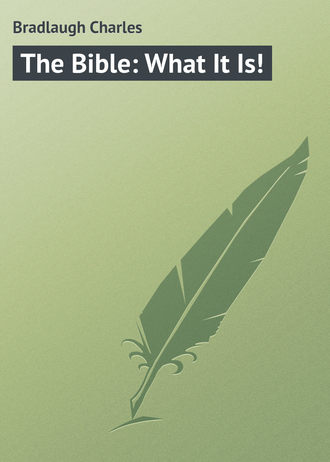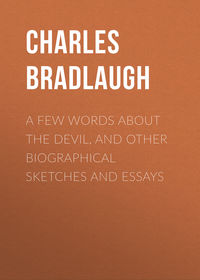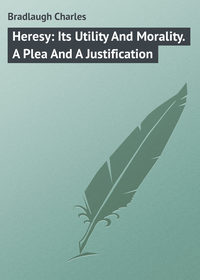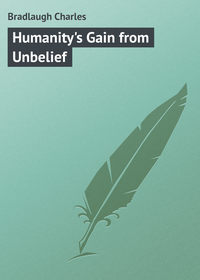 полная версия
полная версияThe Bible: What It Is!
'I am sorry that I have no visions of this consequence to tell you of. Yet you will confess that the vision of the reverend father Cor-delius, of Orleans, in 1534, approaches the nearest to it, though still very distant. The criminal process which it occasioned is still in manuscript in the library of the King of France, No. 1770.
'The illustrious house of St. Memin did great good to the convent of the Cordeliers, and had their vault in the Church. The wife of a Lord of St. Memin, provost of Orleans, being dead, her husband, believing that his ancestors had sufficiently impoverished themselves by giving to the monks, gave the brothers a present, which did not appear to them considerable enough. These good Franciscans conceived a plan for disinterring the deceased, to force the widower to have her buried again in holy ground, and to pay them better. The project was not clever, for the Lord of St. Memin would not have failed to have buried her elsewhere. But folly often mixes with knavery.
'At first, the soul of the lady of St. Memin appeared only to two brothers. She said to them – "I am damned, like Judas; because my husband has not given sufficient." The two knaves who related these words perceived not that they must do more harm to the convent than good. The aim of the convent was to extort money from the Lord of St. Memin, for the repose of his wife's soul. Now if Madame de St. Memin was damned, all the money in the world could not save her. They got no more; the Cordeliers lost their labour.
'At this time there was very little good sense in France: the nation had been brutalised by the invasion of the Franks, and afterwards by the invasion of scholastic theology; but in Orleans there were some persons who reasoned. If the Great Being permitted the soul of Madame de St. Memin to appear to two Franciscans, it was not natural, they thought, for this soul to declare itself damned like Judas. This comparison appeared to them to be unnatural. This lady had not sold our Lord Jesus Christ for thirty deniers; she was not hanged; her intestines had not obtruded themselves; and there was not the slightest pretext for comparing her to Judas.
'This caused suspicion; and the rumour was still greater in Orleans, because there were already heretics there who believed not in certain visions, and who, in admitting absurd principles, did not always fail to draw good conclusions. The Cordeliers, therefore, changed their battery, and put the lady in purgatory.
'She therefore appeared again, and declared that purgatory was her lot; but she demanded to be disinterred. It was not the custom to disinter those in purgatory; but they hoped that Monsieur St. Memin would prevent this extraordinary affront by giving money. This demand of being thrown out of the Church augmented the suspicions. It was well known that souls often appeared; but they never demanded to be disinterred.
'From this time the soul spoke no more, but it haunted everybody in the convent and church. The brother Cordeliers exorcised it. Brother Peter, of Arras, adopted a very awkward manner of conjuring it. He said to it – If thou art the soul of the late Madame de St. Memin, strike four knocks; and the four knocks were struck. If thou art damned, strike six knocks; and the six knocks were struck. If thou art still tormented in hell, because thy body is buried in holy-ground, knock six more times; and the other six knocks were heard still more distinctly. If we disinter thy body, and cease praying to God for thee, wilt thou be the less damned? Strike five knocks to certify it to us; and the soul certified it by five knocks. [Spirit-rapping is therefore more ancient than is generally supposed. 'This interrogation of the soul, made by Peter, of Arras, was signed by twenty-two Cordeliers, at the head of which was the reverend father provincial. This father provincial the next day asked it the same questions, and received the same answers.
'It will be said that the soul having declared that it was in purgatory, the Cordeliers should not have supposed that it was in hell; but it is not my fault if theologians contradict one another.
'The Lord of St. Memin presented a request to the king against the father Cordeliers. They presented a request on their sides; the king appointed judges, at the head of whom was Adrian Fumee, master of requests.
'The Procureur-General of the commission required that the said Cordeliers should be burned; but the sentence only condemned them to make the "amende honorable," with a torch in their bosom, and to be banished from the kingdom. This sentence is of February 18th, 1535.
'After such a vision, it is useless to relate any others: they are all a species either of knavery or folly. Visions of the first kind are under the province of justice; those of the second are either visions of diseased fools, or of fools in good health. The first belong to medicine, the second to Bedlam.'
Verse 3. 'Before the lamp of God went out.' I presume this refers to some lamp kept burning in the tabernacle; but it is a strange mode of description.
Verses 4 to 21. 'Now to appreciate this narrative, I do not intend to reason on its leading features: God comes into a chamber, stands before a bed, speaks as a person of flesh and bones. What should I think of a person who would believe such a fable? I shall confine myself to the conduct and character of Samuel. And first, I demand who saw, who heard, all that was said; who related it, who made it public? It could not be Eli; it could be only Samuel, who was actor, witness, and narrator. He alone had an interest to invent and promulgate. Without him who could have specified the minute details of this adventure? It is evident that we have here a scene of phantasmagoria, resembling those which took place among the ancients in the sanctuaries of the temples, and for the responses of the oracles. The young adept was encouraged to it by the physical and moral feebleness of the high-priest Eli; perhaps by the instigation of some person concealed behind the curtain, and having interests and passions which we cannot now ascertain; though it is most probable that Samuel trusted to no one. What remains to be afterwards seen of his dissimulation, seems to fix the balance on this side. Divulging was not so difficult; he might have been satisfied with the confidence of a servant, a devoted friend, an old or a young priestess, that the apparition of God, the oracle of the holy ark might be rumoured, acquiring from mouth to mouth an intensity of certitude and belief.
'"But Samuel increased (says the text) and God was with him, and none of his words fell to the ground: and all Israel knew that he was become a prophet of God; and God continued to appear in Shiloh." As to the word prophet the historian tells us that, at this epoch, the Hebrew term [ – ] (nebiah) was unknown: that the word [ – ] (raeh) was used, which signifies seer. Here, then, we have a posthumous writer, who connected at pleasure the memoirs which Samuel, or some other contemporary, had composed. It pleased him to set down, as a positive fact, the belief of all Israel in this fable, while he himself knew nothing of the matter. If we had memoirs of those times from several hands, we should have materials for reasonable judgment. It is said in the text, that for some time the word of the Lord had become scarce, and that there appeared no more visions. Why was this? because there were some incredulous; because there had happened bad examples, false oracles, divulging of sacerdotal knavery, which had awakened the good sense of the higher class among the people. The blind and fanatic credulity remained, as it always happens, among the multitude; it was on them that Samuel calculated, and we shall see on the installation of Saul, that he had always against him a party of unbelievers, powerful enough to compel him to use management, and even to oblige him to abdicate.' (Vide Volney.)
Chapter iv., v. 4. 'The ark of the covenant of the Lord of Hosts which dwelleth between the cherubims.' The Douay translates the same thus: – 'The ark of the covenant of the Lord of Hosts sitting upon the cherubims.' As to cherubim see page 21. The word translated ark is [ – ] (aroun). In Parkhurst, under the root [ – ], I find the following remarks which are worthy of consideration: —
'Thus Tacitus informs us that the inhabitants of the north of Germany, our Saxon ancestors, worshipped Herthum or Hertham, that is, the Mother Earth (Terrain Matrem), and believed her to interpose in the affairs of men, and to visit nations; that to her, within a sacred grove in a certain island of the ocean, a vehicle, covered with a vestment, was consecrated, and allowed to be touched by the priest alone, who perceived when the goddess entered into this her secret place (penetrali), and with profound veneration attended her vehicle, which was drawn by cows. While the goddess was on her progress, days of rejoicing were kept in every place which she vouchsafed to visit. They engaged in no war, they meddled not with arms, they locked up their weapons; peace and quietness only were then known, these only relished, till the same priest reconducted the goddess, satiated with the conversation of mortals, to her temple. Then the vehicle and vestment, and, if you will believe it, the goddess herself was washed in a secret lake.
'Among the Mexicans, Vitziputzli, their supreme god was represented in a human shape sitting on a throne, supported by an azure globe, which they called heaven. Four poles or sticks came out from two sides of this globe, at the ends of which serpents' heads were carved, the whole making a litter, which the priests carried on their shoulders whenever the idol was shewed in public' —Picart's Ceremonies and Religious Customs, vol. 3, p. 146.
'In Lieutenant Cook's voyage round the world, published by Dr. Hawksworth, vol. 2, p. 252, we find that the inhabitants of Huaheine, one of the islands lately discovered in the South Sea, had "a kind of chest or ark, the lid of which was nicely sewed on, and thatched very neatly with palm-nut leaves; it was fixed upon two poles, and supported on little arches of wood, very neatly carved. The use of the poles seemed to be to remove it from place to place, in the manner of our sedan-chairs; in one end of it was a square hole, in the middle of which was a ring touching the sides, and leaving the angles open so as to form a round hole within, a square one without. The first time Mr. Banks saw this coffer, the aperture at the end was stopped with a piece of cloth which, lest he should give offence, he left untouched. Probably there was then something within; but now the cloth was taken away, and upon looking into it it was found empty. The general resemblance between this repository and the ark of the Lord among the Jews is remarkable; but it is still more remarkable, that upon inquiring of the (Indian) boy what it was called, he said Ewharre no Eatua, the House of God; he could, however, give no account of its signification or use." In the neighbouring island of Ulietea "were also four or five Ewharre no Eatua, or Houses of God, like that we had seen at Huaheine."' p. 257.
Verse 11. The presence of the ark seems rather to have increased the misfortunes of the Israelites in the previous battle; without the ark they lost 4,000 men, in this they lost 30,000 men, beside also losing possession of the ark.
Chapter v., w. 3 and 4. 'The ark of the God of the Jews was in the profane hands of the Philistines. The people might have profited by the opportunity to destroy the talisman which had so often frightened them; but at this time superstition was universal, and among all nations the priests had a common interest to maintain it, lest contempt for a strange deity should lead their ferocious warriors to examine too closely their own idol. The ark is respected, the priests of the Philistines place it in the temple of their God Dagon, in the city of Azot (or Ashdod). The following day on rising, the people of Azot found the idol Dagon fallen upon its face (the posture of adoration), before the ark; but they raised it up and replaced it. The next day they found it fallen again, but this time the hands and the head were separated from the body, and placed on the threshold of the temple. Whence, I would ask, came this act of audacity and secret knavery? Did some Jew introduce himself into the city with that artifice, that pickpocket stratagem of which the Arabs and the peasants of Egypt and Palestine give, even in our days, astonishing examples? This might be possible; fanaticism might lead to it. The temple had no sentinels; it was even open, and decisive victory might have banished all vigilance. On the other hand, might it not have been the priests of Dagon, who resorted to this knavery from the motive already pointed out? Their subsequent conduct, altogether partial, renders this extremely probable.
'The people of Azot could not believe their God so powerless as to be treated so by human force; they would say, "it is Dagon himself who declares his will, who shows his respect for his brother, the God of the Jews; he did not wish to hold him captive." The alarm spreads, the priests announce some calamity, the effect of the celestial anger, and epidemic disease of the intestines takes place (in that country ruptures and dysenteries are common); then an eruption of rats and field mice was very destructive. The people are confounded, all is attributed to the captivity of the ark. They demand its release, The inhabitants of another town where they take it learn the motive and become alarmed; the disease spreads by contagion, and terror thus becomes general. Finally, after seven months' delay, the military chiefs of the Philistines call before them their priests and divines, and demand of them what they shall do with the ark? It was proposed to burn it, but mark the reply; they advise not only to send it back, but also to offer an expiatory offering for the sin of the warriors. These (as is commonly the case), not less credulous than brave, ask what offering should be given? The priests reply, "make five golden emerods and five mice of gold, according to the number of your principalities, to appease the God of the Hebrews. Why have you hardened your hearts like the King of Egypt? You have been smitten like him; send away also the ark of the God of the Hebrews." Here the spirit and system of the priests are evident; they nourish the public credulity in favour of their particular power, at the expense even of the interests of their own nation. Is there not reason to believe that the trick played by Dagon came from their hands?' (Vide Volney.)
Verse 5. '"Therefore neither the priests of Dagon, nor any that come into Dagon's house, tread on the threshold of Dagon in Ashdod unto this day."
'Bishop Patrick has a note on the words "unto this day: " —
'"The day when Samuel wrote this book: when the events happened he was a youth: but the book was written when he was advanced in years." 'The space of time between this event and Samuel's death was about forty years – not long enough to justify the expression "unto this day." It must not be taken for granted that Samuel wrote this book; and the verse before us tells as plainly as words can express, that Samuel must have been dead many years, perhaps centuries, when it was written. But the commentators have not seen the natural force of the words, on account of the erroneous opinion that Samuel was the writer, with which they would make the narrative harmonise.' ( Vide 'Hebrew Records.')
Verse 9. The Douay adds – 'And the Gethrites consulted together and made themselves seats of skins.'
Chapter vi., v. 5. It is difficult to understand how the Deity could be propitiated by a direct violation of the second commandment.
Verse 19. Psalm 103, v. 8. 'The Lord is slow to anger,' yet 50,070 people slain in an instant for a mere act of indiscretion.
'Bethshemesh was a village belonging to God's people, situated, according to commentators, two miles north of Jerusalem.
'The Phoenicians having in Samuel's time beaten the Jews and taken from them their ark of allegiance in the battle in which they killed thirty thousand of their men, were severely punished for it by the Lord:
'"He struck them in the most secret part of the buttocks; and the fields and the farm houses were troubled… and there sprung up mice; and there was a great confusion of death in the city."
'The prophets of the Phoenicians or Philistines having informed them that they could deliver themselves from the scourge only by-giving to the Lord five golden mice and five golden emerods, and sending him back the Jewish ark, they fulfilled this order, and according to the express command of their prophets, sent back the ark with the mice and emerods on a waggon drawn by two cows, with each a sucking calf, and without a driver.
'These two cows, of themselves, took the ark straight to Bethshemesh. The men of Bethshemesh approached the ark in order to look at it; which liberty was punished yet more severely than the profanation by the Phoenicians had been. The Lord struck with sudden death seventy men of the people and fifty thousand of the populace.
'The Reverend Doctor Kennicott, an Irishman, printed in 1768 a French commentary on this occurrence, and dedicated it to the Bishop of Oxford. At the head of this commentary he entitles himself Doctor of Divinity, Member, of the Royal Society of London, of the Palatine Academy, of the Academy of Gottingen, and of the Academy of Inscriptions at Paris. All that I know of the matter is, that he is not of the Academy of Inscriptions at Paris. Perhaps he is one of its correspondents. His vast erudition may have deceived him; but titles are distinct from things.
'In this pamphlet he pretends to prove that the Scripture text has been corrupted. Here we must be permitted to differ with him. Nearly all Bibles agree in these expressions: seventy men of the people, and fifty thousand of the populace. 'The Reverend Doctor Kennicott says to the Right Reverend the Lord Bishop of Oxford, that formerly there were strong prejudices in favour of the Hebrew text; but that for seventeen years his lordship and himself have been freed from their prejudices, after the deliberate and attentive perusal of this chapter.
'In this we differ from Dr. Kennicott; and the more we read this chapter the more we reverence the ways of the Lord, which are not our ways. It is impossible (says Kennicott) for the candid reader not to feel astonished and affected at the contemplation of fifty thousand men destroyed in one village – men, too, employed in gathering the harvest.
'This does, it is true, suppose a hundred thousand persons at least in that village; but should the Doctor forget that the Lord had promised Abraham that his posterity should be as numerous as the sands of the sea?
'The Jews and the Christians (adds he) have not scrupled to express their repugnance to attach faith to this destruction of fifty thousand and seventy men.
'We answer that we are Christians, and have no repugnance to attach faith to whatever is in the Holy Scriptures. We answer with the Reverend Father Calmet, that "if we were to reject whatever is extraordinary and beyond the reach of our conception, we must reject the whole Bible." We are persuaded that the Jews being under the guidance of God himself, could experience no events but such as were stamped with the seal of the divinity, and quite different from what happened to other men. We will even venture to advance that the death of these fifty thousand and seventy men is one of the least surprising things in the Old Testament.
'We are struck with astonishment still more reverential when Eve's serpent and Balaam's ass talk; when the waters of the cataracts are swelled by rain fifteen cubits above all the mountains; when we behold the plagues of Egypt, and the six hundred and thirty thousand fighting Jews, flying on foot through the divided and suspended sea; when Joshua stops the sun and moon at noon-day; when Sampson slays a thousand Philistines with the jaw-bone of an ass… In those divine times all was miracle, without exception; and we have the profoundest reverence for all these miracles; for that ancient world which was not our world; for that nature which was not our nature; for a divine book, in which there can be nothing human.
'But we are astonished at the liberty which Dr. Kennicott takes of calling those Deists and Atheists, who, while they revere the Bible more than he does, differ from him in opinion. Never will it be believed that a man with such ideas is of the academy of medals and inscriptions. He is, perhaps, of the academy of Bedlam, the most ancient of all, and whose colonies extend throughout the earth.' (Philosophical Dictionary.)
Verse 19. The Douay renders this – 'He slew of the people seventy men, and fifty thousand of the common people;'
Chapter vii., v. 1. What were the men of Kirjathjearim, that they should enjoy complete immunity from the ills which attended the other unfortunates who came in contact with the ark, and what gave them the right to sanctify Eleazar? Kirjathjearim was a city of the Gibeonites. (Joshua, chap, ix., v. 17.)
Verse 6. 'Drew water, and poured it out before the Lord.' This is a mode of sacrifice, or rather of offering, to the Lord which I do not find mentioned elsewhere in the Old Testament.
Verse 13. It is not true that the Philistines came no more into the coast of Israel. (Vide chap, xvii., v. 1.)
Verse 15. 'And Samuel judged Israel all the days of his life.' Bishop Patrick's interpretation of this stubborn verse may be quoted, but to be as speedily rejected; because it perverts the plain meaning of words, for the purpose of making them support a preconceived theory: —
'"As Samuel was the author of this book, he could not speak literally of 'all the days of his life;' the sense probably is, that he was so diligent in the discharge of his office, that he gave himself no rest, but sat to judge causes every day."'
'It is almost a waste of words to reply to such a manifest perversion of the meaning. "All the days of his life" means "the whole of his life," not "every day: " and the use of these words shows that Samuel could not have been the author of the book. But the commentator, taking for granted that Samuel was the author of the book, has twisted the meaning of words to suit this preconceived notion.' (Dr. Giles.)
Chapter viii., v. 3. The sons of Samuel seem to have been equally as vicious as the sons of Heli, yet Samuel escapes punishment.
Verses 6 to 9. 'The thing displeased Samuel,' doubtless it did, he disliked having to resign the supreme power. Volney says: —
'A conspiracy was evidently formed; for, according to the historian, a deputation from the sages of Israel came to find Samuel, at his residence at Ramatha, to demand from him a king – a royal government, constituted like that of the neighbouring people, to whose example generally his attention was directed. The answer which he gave to this deputation, and the details of his conduct in this affair, disclose the anger of disappointed ambition, of a pride deeply wounded. It was necessary for him to bend to force, to yield to necessity. But we shall see him in the execution exhibit a cunning intellect, even to perfidy, which, by its analogy to the adventures in the temple, his pretended visions and nocturnal revelations, discovers all his character.
'They forced Samuel to name a king. He might, he ought to have chosen, the man the most capable by his talents and by his resources, to fill this eminent post. But this he avoided. Such a man would reign by himself, and not obey him. A docile subject was necessary. He sought him in a family of low degree, without adherents; but having that exterior which would impose on the people. His choice was that of one who, having just enough sense necessary to transact ordinary business, was constantly under the necessity of recurring to a benefactor, who could preserve a strict hand over him. Samuel, in a word, selected a handsome man of war, who should possess the executive, and be his lieutenant, while he would continue to hold the legislative reigning power. Here is the secret of all the conduct which we shall see him pursue in the elevation of Saul, in the disgrace of this king, and in the substitution of David, another trait of sacerdotal Machiavelism.'








